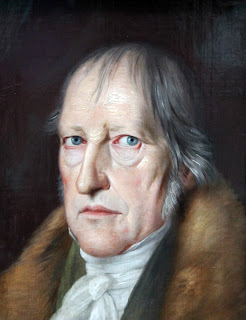Disco Dialectic
The Hegelian notion of the dialectic remains a hot topic! You may need to turn your mind into a database of Hegel's Werke in order to piece together evidence and solve such… complicated puzzles! And here we are, celebrating his birthday (August 27, 1770) by trying to pierce through the philosopher's texts on logic and political science.
Let's see if we can elucidate the meaning and use of the dialectic drawing on Hegel's own propositions.
Point of departure
Hegel intended his Encyclopedia of the Philosophical Sciences to serve as a textbook for his university courses. During the first part of this book, he notes that the dialectic demonstrates the “immanent process of going beyond” the finite and one-sided determinations on which the faculty of understanding (Verstand) usually fixates. In fact, "every finite is this, the sublating of itself" -- "[w]e know that all finite things, instead of being something fixed and ultimate, are really changeable and perishable, and this is nothing but the dialectic of the finite". Negativity and progression
The dialectic is also the principle "through which alone an immanent connection and necessity enters into the content of science". In the Science of Logic for example Hegel connects the dialectic with the “course of the fact itself”. It is precisely the content that possesses the dialectic – the “negative” – “within itself” and thus develops itself further.
In Hegel's 1821 treatise Elements of the Philosophy of Right, we read that the dialectic is immanent in the subject matter -- “the moving principle of the concept” of right. Further, during his 1822/23 university lectures on the same topic Hegel underlines that abstract determinations of right (such as property, family, morality, civil society) cannot exist on their own without the totality they comprise· they eventually require totality as their ground. This sort of preeminence must be explicated through the immanent demonstration of the
finitude pertaining to each of the abstract shapes of right. This course enables us to find the necessity of the progress of the subject matter. The method
Hence, the so called "hegelian method" consists in the self-development of the subject itself, the matter under consideration – for example the concept of right – through which it becomes the proof of itself. Regarding the above-mentioned example of the philosophy or right, the dialectic is not a blueprint externally applied, but rather enables us to grasp the seemingly externally arranged subdivision of particular and seemingly isolated determinations of right in an organized course, which demonstrates the limitation and relative necessity of each.
Hegel, Enzyklopädie, § 81 A: 172-173; Encyclopedia,129.
Ibidem, § 81 A: 173; 129.
Hegel, Wissenschaft der Logik I. Die objektive Logik, in Werke
in zwanzig Bänden, volume 5, E. Moldenhauer, K. M. Michel (eds.), Frankfurt
am Main, Suhrkamp, 1969: 50. The Science of Logic, tr. by George Di Giovanni, Cambridge,
Cambridge University Press, 2010, 33.
Hegel, Logik, 51; Science of Logic, 34.
Hegel Grundlinien der Philosophie des Rechts oder
Naturrecht und Staatswissenschaft im Grundrisse, in Werke,
vol. 7, E. Moldenhauer and K. M. Michel (eds.), Frankfurt am Main, Suhrkamp, § 31 A: 84. Elements of the Philosophy of Right, tr. by Hugh Barr Nisbet, Cambridge, Cambridge
University Press, 2015, 60.
Hegel Grundlinien, § 31 A: 84; Philosophy of Right, 60.
See Hegel, Philosophie des Rechts. Nach der
Vorlesungsnachschrift von H. G. Hotho 1822/23, in Vorlesungen
über Rechtsphilosophie 1818-1831, vol. 3, Karl-Heinz Ilting (ed.),
Stuttgart-Bad Cannstatt, frommann-holzboog, § 32: 164-168.





No comments:
Post a Comment